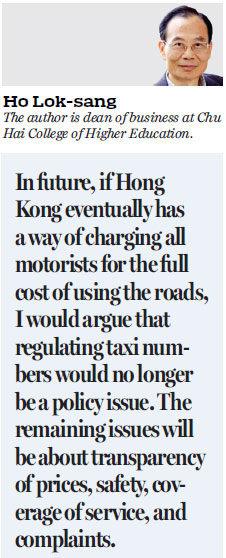Technology cruises past owners of taxi licenses
Updated: 2017-04-19 07:43
By Ho Lok-sang(HK Edition)
|
|||||||
Ho Lok-sang says Uber and premium service put pricy license model in jeopardy but industry needs to adapt
The taxi industry in Hong Kong is facing a turning point. On the one hand, there is the challenge of the "sharing economy", spearheaded by the entry of Uber into the Hong Kong market. On the other hand, for the first time, the special administrative region government is offering three premium taxi operating franchises, each to run up to 200 taxis, with a view to offering an alternative of more pricy but higher-quality taxi services. These licenses represent a dramatic departure from the traditional taxi medallions, which let taxi owners permanently own the "license" to operate taxis in Hong Kong. There are three kinds of taxis - urban taxis, the New Territories taxis and the Lantau taxis, and thus three different kinds of medallions. The price of urban taxi medallion reached a new high in excess of HK$7 million ($900,000) in 2014 but recently has softened to trade at about HK$6.5 million. Taxi owners are not very happy these days because they now face not only the competition of Uber but also the imminent launch of the premium taxis. Actually, medallion prices in Hong Kong are holding up pretty well, in large part because Uber operators have to face the possibility of being prosecuted for driving cars for commercial purposes without a hired car permit. In contrast, medallions in New York City today are trading at half the prices seen in 2014.

What is the rationale for requiring taxis to be licensed, and why do governments restrict entry into the taxi market? Why is it possible for Singapore to legalize Uber without raising an eyebrow among taxi operators?
In an early paper I have argued that because taxis typically cruise in a city's roads for the greater part of the day, and thus use up a lot of road space and cause much more congestion, pollution, and risks of accidents than private cars, there is a need to regulate the size of the taxi fleet. In a city that has not implemented road pricing, allowing free entry into the taxi industry would result in there being too many taxis. The cost imposed on society for having one more taxi would be much greater than the benefit it brings.
This external cost imposed on society is generally rising in the city over time. This reflects the rising cost of time and the greater valuation of health and life as the city becomes more affluent and as the value of time grows. Largely because of this and the need to control taxi numbers, Hong Kong has refrained from auctioning additional urban taxi medallions for a long time. This has led medallion prices to appreciate quickly. The attempt to contain the external costs of taxis produced a huge capital gain for medallion owners.
Singapore's regulators are smarter than Hong Kong's. They did not auction off medallions that give owners a permanent right to operate taxis and thus a vested interest in keeping medallion prices high. Instead, Taxi Service Operator Licenses have to be renewed periodically. Moreover, because Singapore has implemented electronic road pricing, taxis already pay their social cost of running on the roads, so it was possible for Singapore to liberalize the taxi industry in 2003 to allow free entry of new companies to join in the competition.
Since we are still only talking about electronic road pricing, the external costs of additional taxis on roads must not be discounted. If Uber taxis are to be legalized, their taxis need to pay for the cost of using the roads. This can easily be achieved by a revenue sharing formula, with the government effectively taxing some percentage of the revenue derived. Provided the "tax rate" is appropriate, Uber operators will have paid for the full cost of using the roads, and there would be no reason to outlaw this "share economy" application.
Actually, I had proposed electronic road pricing back in the early 1970s while I was still a student at the University of Hong Kong. It is sad for Hong Kong to keep lagging behind others. We have always chosen to be a follower, apparently always looking up to Singapore for our public policies. Singapore became the first to introduce electronic road pricing, and is ahead of us in legalizing Uber. But its model is not necessarily the best. We can find our own way, if only we will.
The legalization of Uber and other share economy applications should be based on economic considerations alone. It is not right for Uber operators to use our roads without paying for the cost. But there is no need to protect the values of medallions. Any investment carries risks, and investors may make or lose money.
In future, if Hong Kong eventually has a way of charging all motorists for the full cost of using the roads, I would argue that regulating taxi numbers would no longer be a policy issue. The remaining issues will be about transparency of prices, safety, coverage of service, and complaints.
(HK Edition 04/19/2017 page7)